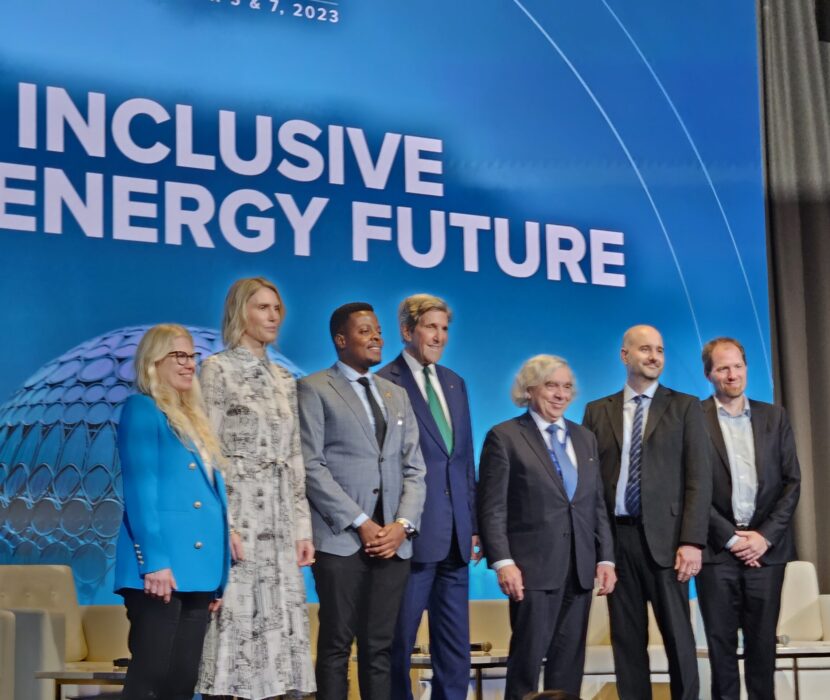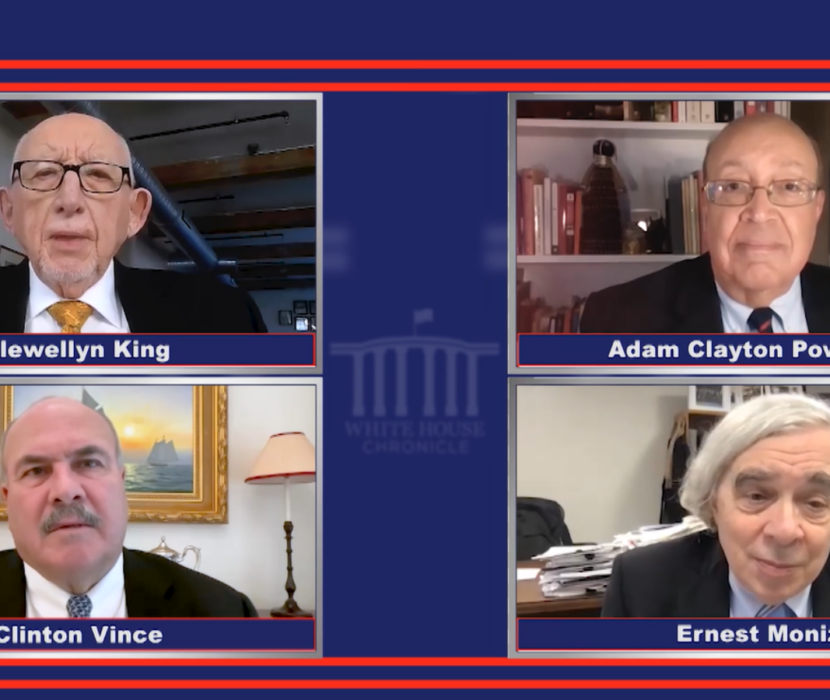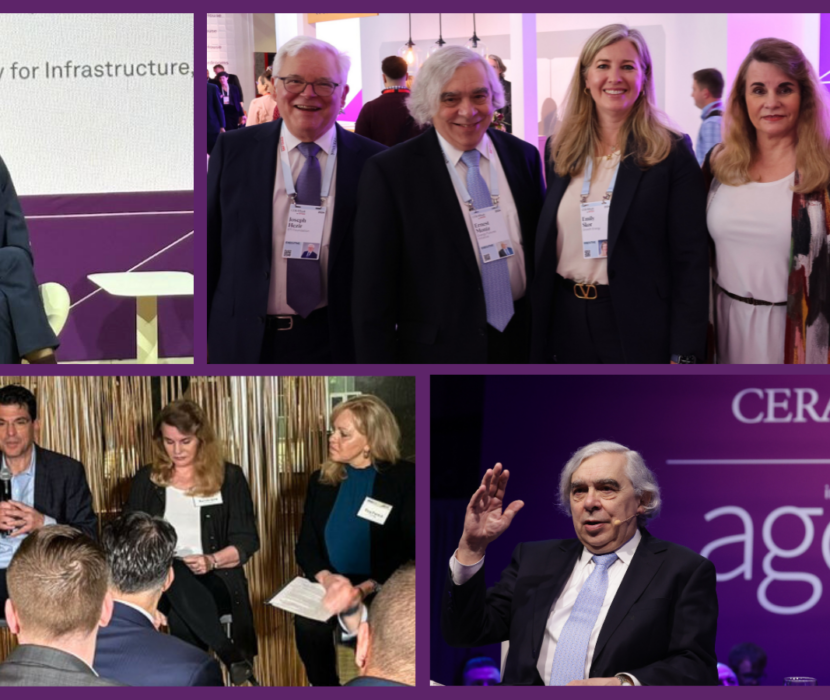As the world slowly reopens to some form of normalcy, universities across the nation are hosting commencement ceremonies for their spring class — in person. The University of New Mexico (UNM) recognized its class of 2021 with an outdoor ceremony at University Stadium. EFI Principal and UNM aluma Melanie Kenderdine was the keynote speaker, recanting her experience growing up in the East Mountains. The New Mexico native gave a compelling and wise speech that motivated graduates to be prepared to take risks, look for mentors, and help move our great country forward. Read and watch her address in its entirety here.

Good morning, UNM’s esteemed class of 2021. I offer you my deepest congratulations as you start the next phase of your lives. I know the pandemic has made this a very difficult year for students everywhere — you are to be highly commended for your accomplishments under conditions few of us have ever experienced. Also, my thanks to President Stokes for the invitation to speak and to everyone who worked so hard to put this event together.
As you heard in President Stokes’ introduction, I am a proud UNM graduate. My diploma says I graduated in December 1977. In fact, I had the credits I needed to graduate a semester earlier. I, however, had hundreds of dollars of parking tickets from the campus police and couldn’t get my diploma until I paid them. I can’t remember how I got the money, but it took me another semester to officially graduate. Just goes to show you that after 44 years, you can go from being a UNM parking ticket deadbeat to a UNM commencement speaker! How’s that for inspiration!
I grew up in this beautiful state. My mother got her nursing degree at UNM, and my father and stepmother are also UNM graduates. When I was young, I lived on the East side of the Sandias and roamed the mountains on the back of my horse.
I tell you this because I want you to know where I have come from…how important my home is to me…and how New Mexico and UNM helped shape my life and the lives of my family.
Let me turn to a few things I have learned in my career that might be useful as you start building yours.
First — because I think it’s a priority — be prepared to take risks. Not too far out of college and not yet financially secure, I quit a relatively well-paid job to volunteer in Bill Richardson’s 1982 campaign in New Mexico’s new third Congressional district. He took me to DC when he won — and I did his Energy Committee work on Capitol Hill for six years.
This set me on the career pathway I continue to follow today. My energy background and commitment to deep decarbonization have focused my professional activities and actions on global, national, and regional systems…geopolitics…technologies…innovation… investments…and policies to address climate change. Your experiences will be different from mine — but whatever you do…work with commitment…develop broad and deep expertise…take risks, they will pay off.
Also, look for mentors. They are invaluable. Studies show the one common factor for people who have succeeded against all odds is a mentor who helped and guided them. Two energy secretaries, one also a former Congressman — Bill Richardson and Ernie Moniz — are my mentors. They both pushed me, taught me, challenged me, then relied on me. Find people you admire, help them, work hard for them — and they will help you.
Next, build things from scratch. I helped start the MIT Energy Initiative in Cambridge and stood up DOE’s Energy Policy and Systems Analysis Office. I started an energy R&D company in 2002, and in 2017 co-founded the Washington think tank where I currently work. And for 10 years now, a program I started when I was at MIT — the C3E symposium series — has, been awarding cash prizes to outstanding women in clean energy disciplines. These experiences have been incredibly rewarding for me — I encourage you to start things, build things, change things.
Another lesson: Look for opportunities to right wrongs. When Bill Richardson was Energy Secretary — he came to DOE in 1998, I had been there as a Clinton political appointee since 1993, I worked for him in two different capacities — the career employees were about to transfer one of DOE’s Naval Oil Shale Reserves to the Interior Department, an action that was allowed but not required in a new law. I stopped them, went to Bill to discuss options, and we discovered that the Reserve was in the center of the Ute Reservation in Utah, in effect a donut hole in their land. This property was taken from them 100 years earlier, when oil was growing in importance to the US economy. In the end, we gave that land back to the tribe –it was the largest single lower 48 land transfer back to Native Americans in over a century. The Utes invited us to the ceremony they held for the return of their land — an event I will never, ever forget. Look for these opportunities in your fields of endeavor, make the world a better place.
Next, analyze and innovate. I do this in the energy space — but it’s needed everywhere. Put your educations to work in your fields — and use data, analysis, and innovation to guard against the knee-jerk ideologies on both the right and the left that contribute to the great divide we see in our society today.
Let me say a few more things about this divide. We are living in very tumultuous times. The COVID pandemic…the loss of hundreds of thousands of our friends, relatives, and neighbors…job losses at a scale not seen since the 1930s… this could be the “uber” crisis of my lifetime. But let me offer a little perspective on other severe crises of the past that we have managed to pull through and come out better on the other side.
When I was in elementary school, the US and the Soviet Union took the world to the brink of a nuclear war in what was called the Cuban Missile Crisis. At age seven I lived in fear I would be vaporized at any second.
In 1968, when I was in Junior High (it was junior high then, not middle school!), Martin Luther King and Bobby Kennedy — two leaders I revered — were assassinated.
When I was in high school, four Kent State University students protesting the Viet Nam war were shot and killed by the National Guard — this launched something akin to a “student lives matter” movement — after the Kent State killings, 500,000 people marched on Washington to protest the war.
When I was in college, within one year, both the Vice President and the President of the United States were forced to resign for criminal actions. People I knew went to prison for years for possession of a single marijuana joint and, as a woman, I needed the signature of my father or my husband just to get a credit card ((had a father, no husband yet).
I know, I know. Many of you are thinking “OK Boomer”.
But a little history is important. History is instructive. It makes us who we are, points us to where we are going. It’s important for perspective.
In this regard, let me underscore some key — and critical — differences between then and now. When I was young child, we had three TV networks, very few options for our evening entertainment, no Fox News, CNN or MSNBC. Almost everyone sat down after dinner on Sunday night and watched that great morality play of the 1960s, the TV Western “Bonanza. A few years later, everyone watched “All in the Family” where, in spite of diverse political views, family and neighborly love conquered all — a critical message that a huge audience heard on a weekly basis.
While these limited options placed boundaries on our universe, they also gave disparate people across the country a core set of shared experiences and messages — essentially a solid platform for a nationwide value system.
I worry today about the loss of these broadly shared — and embraced — experiences. I fear that the wide range of communications options, cable stations, social media, twitter, etc., enable — indeed encourage — people to retreat to their own corners, talk only to those who agree with them, shut out competing views. We think we are absolutely correct because we don’t communicate with those who might think otherwise. Tribalism — yes, it is a form of tribalism — offers a difficult base from which to run a country of 330 million people. Sadly, the January 6th attack on the Capitol put a violent exclamation point at the end of a sentence describing these times of division, anger, and conspiracy theories.
When I started working in Congress in 1983, the dialogue between Democrats and Republicans was real…compromise was embraced… …Red States vs. Blue States was not part of the vernacular. This has slipped away, enabled, empowered by anger, the ability — and willingness — to only talk to the like-minded.
And I am not saying new technologies, digitalization, social media don’t have benefits and value — they do, and are enriching our lives in many, many ways. We couldn’t have made it through the COVID crisis without the internet. Sadly, those kids who live in areas without broadband haven’t been able to go to school for over a year. And just a note from my experience in this regard. I have been running two businesses remotely for over a year now. I say with authority that the most frequently used new phrase in business operations in the US is “you are on mute”! Seriously and clearly, these new technologies are critical to today’s world.
What I am saying is that we need new tools to support coalition building…new platforms for having conversations with those who don’t always agree with us…new venues where disagreements are resolved via compromise, not with guns and violence. After the Cuban Missile crisis, a hotline was set up between the heads of state of the US and Soviet Union. Sadly, today, we need to establish hotlines between the right and the left……between urban and rural America…between Red and Blue states. You need to go out there and help build those linkages.
One last bit of advice. Choose wisely, love well, and cherish your friends. I could not have had my career and raised a brilliant child without the support of my spouse (he’s retired and working on his second master’s degree at guess where — UNM!). Also, my best friends from elementary school, high school, and college are all UNM grads. They have enriched my world in many, many ways — I can’t imagine my life without them in it.
Some of you will leave, others will stay in New Mexico — that’s great, the state needs your talent. Regardless of where you end up however, go out there and make things better, start new things, take risks, and perhaps, most importantly in today’s difficult times — use your talents, brains, and experience to build bridges, alliances and coalitions that will help move our great country forward.
UNM Class of ‘21 — you — are the future. Again, my heartfelt congratulations — now go out and change the world!! And go Lobos!!!!
(Share this post with others.)




